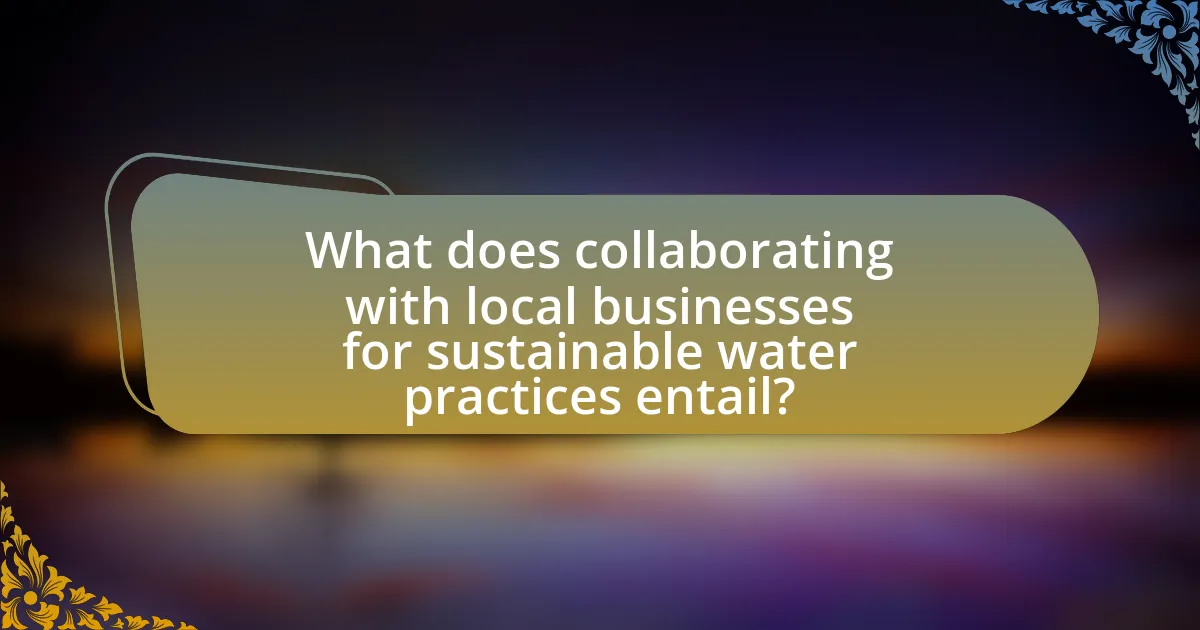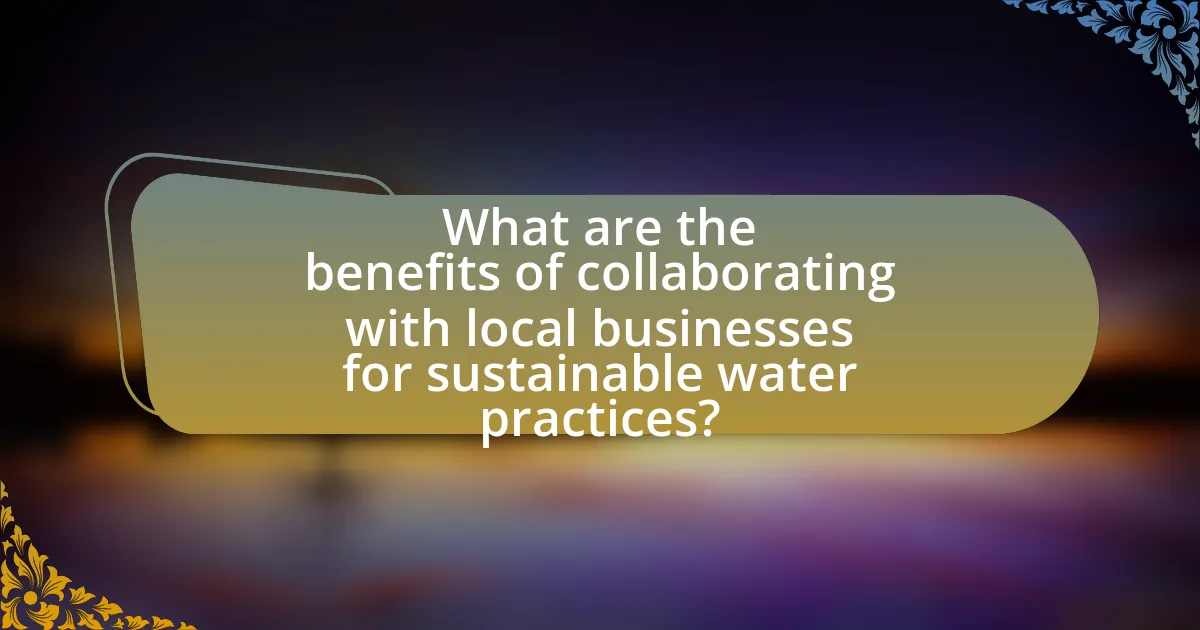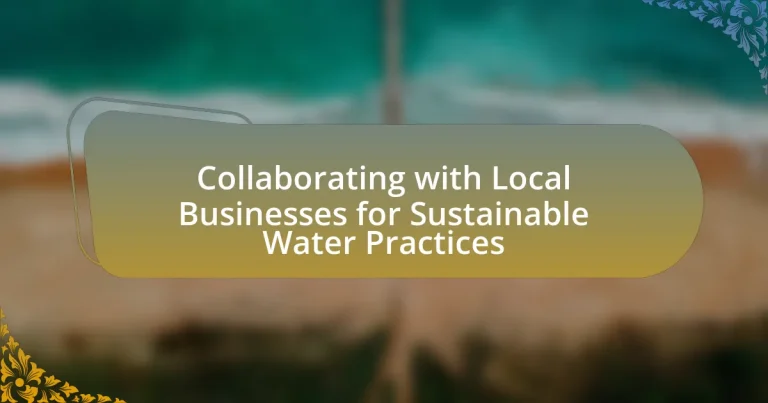Collaborating with local businesses for sustainable water practices involves forming partnerships to implement water conservation strategies and promote responsible water usage. This collaboration enhances resource efficiency, reduces waste, and protects local water sources through shared resources and knowledge. Local businesses play a vital role by adopting water-efficient technologies, educating customers, and engaging in community initiatives. However, challenges such as differing priorities and resource constraints can hinder these efforts. Successful collaboration can lead to significant environmental benefits, improved community engagement, and economic advantages, ultimately contributing to better water management and ecosystem health.

What does collaborating with local businesses for sustainable water practices entail?
Collaborating with local businesses for sustainable water practices entails forming partnerships to implement water conservation strategies and promote responsible water usage. This collaboration can involve sharing resources, knowledge, and technology to enhance water efficiency, reduce waste, and protect local water sources. For instance, businesses may adopt rainwater harvesting systems or wastewater recycling methods, which can lead to significant reductions in water consumption. According to the U.S. Environmental Protection Agency, businesses that implement water-efficient practices can save up to 30% on their water bills, demonstrating the financial and environmental benefits of such collaborations.
Why is collaboration important for sustainable water practices?
Collaboration is crucial for sustainable water practices because it enables the pooling of resources, knowledge, and expertise among various stakeholders. When local businesses, government agencies, and community organizations work together, they can implement more effective water management strategies that address specific regional challenges. For instance, a study by the World Resources Institute highlights that collaborative efforts can lead to a 30% increase in water efficiency in agricultural practices when farmers and businesses share best practices and technologies. This collective approach not only enhances resource conservation but also fosters innovation and resilience in water management systems.
What roles do local businesses play in promoting sustainable water practices?
Local businesses play a crucial role in promoting sustainable water practices by implementing water-efficient technologies and practices, educating their customers, and collaborating with community initiatives. These businesses often adopt water-saving measures, such as low-flow fixtures and rainwater harvesting systems, which can significantly reduce water consumption. For instance, a study by the U.S. Environmental Protection Agency found that businesses that implement water efficiency measures can reduce their water use by 20-30%, leading to cost savings and environmental benefits. Additionally, local businesses can serve as platforms for community education, raising awareness about the importance of water conservation through workshops and promotional campaigns. By partnering with local governments and environmental organizations, these businesses can further enhance their impact, contributing to broader community efforts aimed at sustainable water management.
How can collaboration enhance community engagement in water sustainability?
Collaboration enhances community engagement in water sustainability by fostering shared responsibility and collective action among stakeholders. When local businesses, government entities, and community members work together, they can pool resources, knowledge, and expertise to implement effective water conservation strategies. For instance, partnerships can lead to the development of community workshops that educate residents on sustainable practices, resulting in increased participation and awareness. Research shows that communities involved in collaborative water management initiatives report higher levels of engagement and commitment to sustainability goals, as evidenced by the success of programs like the WaterSense program by the U.S. Environmental Protection Agency, which encourages partnerships to promote water efficiency.
What are the key challenges in collaborating with local businesses?
The key challenges in collaborating with local businesses include differing priorities, communication barriers, and resource constraints. Local businesses often prioritize immediate financial gains over long-term sustainability goals, which can lead to misalignment in objectives. Additionally, effective communication can be hindered by varying levels of understanding regarding sustainable practices, resulting in misunderstandings or lack of engagement. Resource constraints, such as limited time and funding, can further complicate collaboration efforts, making it difficult for local businesses to commit to sustainable initiatives. These challenges are supported by studies indicating that successful partnerships require clear alignment of goals and adequate resources to foster collaboration.
What barriers do local businesses face in adopting sustainable water practices?
Local businesses face several barriers in adopting sustainable water practices, including high initial costs, lack of knowledge, and insufficient regulatory support. High initial costs deter businesses from investing in water-efficient technologies and systems, as many may not have the capital to make such investments upfront. Additionally, a lack of knowledge about sustainable practices and available technologies can hinder businesses from implementing effective solutions. Furthermore, insufficient regulatory support can create an environment where there is little incentive for businesses to adopt sustainable practices, as they may not see immediate benefits or may be unaware of potential long-term savings. These barriers collectively impede the transition to sustainable water management in local businesses.
How can these challenges be overcome through collaboration?
Collaboration can overcome challenges in sustainable water practices by leveraging shared resources and expertise among local businesses. When businesses unite, they can pool financial resources to invest in advanced water-saving technologies, which individual entities may find cost-prohibitive. For instance, a study by the World Resources Institute highlights that collaborative initiatives can lead to a 20-30% reduction in water usage through joint investments in infrastructure. Additionally, sharing best practices and knowledge among businesses fosters innovation and accelerates the adoption of sustainable methods. This collective approach not only enhances operational efficiency but also strengthens community ties, creating a more resilient framework for addressing water-related challenges.

How can local businesses implement sustainable water practices?
Local businesses can implement sustainable water practices by adopting water-efficient technologies and promoting conservation efforts. For instance, installing low-flow fixtures and rainwater harvesting systems can significantly reduce water consumption. According to the U.S. Environmental Protection Agency, businesses can save up to 30% on water bills by using water-efficient appliances. Additionally, conducting regular water audits helps identify areas for improvement and encourages responsible water use among employees and customers. By engaging in community initiatives, such as local clean-up events or educational workshops, businesses can further enhance their commitment to sustainable water practices.
What strategies can local businesses adopt for water conservation?
Local businesses can adopt several effective strategies for water conservation, including implementing water-efficient fixtures, conducting regular audits to identify leaks, and utilizing rainwater harvesting systems. Water-efficient fixtures, such as low-flow faucets and toilets, can significantly reduce water usage by up to 30% according to the U.S. Environmental Protection Agency. Regular audits help businesses detect leaks that can waste thousands of gallons annually, while rainwater harvesting systems can collect and store rainwater for irrigation and other non-potable uses, further reducing reliance on municipal water supplies. These strategies not only conserve water but also lower operational costs, making them beneficial for both the environment and the business’s bottom line.
How can businesses assess their water usage effectively?
Businesses can assess their water usage effectively by implementing water audits, which involve systematically measuring and analyzing water consumption across all operations. This process allows businesses to identify areas of excessive use, leaks, and opportunities for conservation. According to the U.S. Environmental Protection Agency, conducting regular water audits can lead to water savings of 20-50% in commercial facilities. Additionally, utilizing smart metering technology provides real-time data on water usage, enabling businesses to make informed decisions and track improvements over time.
What technologies can assist in improving water efficiency?
Technologies that can assist in improving water efficiency include smart irrigation systems, water recycling technologies, and moisture sensors. Smart irrigation systems utilize weather data and soil moisture levels to optimize watering schedules, reducing water waste by up to 50% according to the Environmental Protection Agency. Water recycling technologies, such as greywater systems, allow for the reuse of water from sinks and showers for irrigation, significantly decreasing overall water consumption. Moisture sensors provide real-time data on soil conditions, enabling precise watering and further enhancing water conservation efforts.
What partnerships can enhance sustainable water practices?
Collaborations between local governments, businesses, and non-profit organizations can significantly enhance sustainable water practices. These partnerships enable the sharing of resources, expertise, and technology, which are essential for implementing effective water conservation strategies. For instance, local businesses can adopt water-efficient technologies and practices, while governments can provide incentives and support for these initiatives. Research from the World Resources Institute indicates that collaborative efforts in water management can lead to a 20-30% reduction in water usage in urban areas, demonstrating the effectiveness of such partnerships in promoting sustainability.
How can local governments support businesses in water sustainability efforts?
Local governments can support businesses in water sustainability efforts by providing financial incentives, technical assistance, and regulatory frameworks that promote efficient water use. For instance, offering grants or tax breaks for companies that implement water-saving technologies encourages investment in sustainable practices. Additionally, local governments can facilitate workshops and training programs to educate businesses on best practices for water conservation. Research from the Environmental Protection Agency indicates that businesses that adopt water-efficient practices can reduce water use by 20-50%, demonstrating the effectiveness of such support.
What role do non-profit organizations play in fostering collaboration?
Non-profit organizations play a crucial role in fostering collaboration by acting as intermediaries that connect various stakeholders, including local businesses, government entities, and community members. They facilitate partnerships by providing resources, expertise, and a neutral platform for dialogue, which encourages collective action towards common goals. For instance, non-profits often organize workshops and forums that bring together diverse groups to share knowledge and best practices, particularly in areas like sustainable water management. Research indicates that collaborative efforts led by non-profits can lead to more effective and sustainable outcomes, as seen in initiatives that have successfully reduced water usage and improved local ecosystems through joint efforts among businesses and communities.

What are the benefits of collaborating with local businesses for sustainable water practices?
Collaborating with local businesses for sustainable water practices enhances resource efficiency and community engagement. This partnership allows for the sharing of knowledge and resources, leading to innovative solutions that reduce water waste and improve water quality. For instance, local businesses can implement rainwater harvesting systems, which not only conserve water but also reduce stormwater runoff, benefiting the local ecosystem. Additionally, studies show that community-based initiatives, such as those involving local businesses, can increase public awareness and participation in sustainable practices, leading to a more informed and proactive community regarding water conservation.
How does collaboration impact the local economy?
Collaboration positively impacts the local economy by fostering innovation, increasing efficiency, and enhancing resource sharing among businesses. When local businesses collaborate, they can pool resources, share knowledge, and develop joint initiatives that lead to cost savings and improved services. For instance, a study by the National Bureau of Economic Research found that regions with higher levels of business collaboration experience a 20% increase in productivity, which directly contributes to economic growth. Additionally, collaborative efforts can attract investment and create job opportunities, further stimulating the local economy.
What economic advantages do businesses gain from sustainable practices?
Businesses gain several economic advantages from sustainable practices, including cost savings, enhanced brand reputation, and increased customer loyalty. Implementing energy-efficient technologies can significantly reduce operational costs; for instance, companies that adopt energy-efficient practices can save up to 30% on energy bills, according to the U.S. Department of Energy. Additionally, sustainable practices often lead to improved resource management, which can minimize waste and reduce expenses related to raw materials. Furthermore, businesses that prioritize sustainability tend to attract environmentally conscious consumers, leading to increased sales and market share. A Nielsen report indicates that 66% of global consumers are willing to pay more for sustainable brands, highlighting the financial benefits of aligning business practices with sustainability.
How can community awareness and support be increased through collaboration?
Community awareness and support can be increased through collaboration by engaging local businesses in educational initiatives and joint projects focused on sustainable water practices. Collaborative efforts, such as workshops and community events, allow businesses to share their expertise and resources, fostering a sense of shared responsibility among community members. For instance, a study by the American Water Works Association found that community engagement initiatives led to a 30% increase in public awareness about water conservation efforts. By leveraging local business networks, communities can amplify their outreach, ensuring that information about sustainable practices reaches a broader audience and encourages active participation.
What environmental benefits arise from these collaborations?
Collaborations with local businesses for sustainable water practices yield significant environmental benefits, primarily through improved water conservation and reduced pollution. These partnerships often lead to the implementation of efficient water management systems, which can decrease water usage by up to 30%, as evidenced by case studies in various municipalities. Additionally, local businesses can adopt practices that minimize runoff and contamination, thereby protecting local ecosystems and enhancing biodiversity. For instance, initiatives such as rainwater harvesting and the use of permeable surfaces have been shown to effectively reduce stormwater runoff, leading to cleaner waterways.
How do sustainable water practices contribute to ecosystem health?
Sustainable water practices contribute to ecosystem health by ensuring the availability and quality of water resources, which are essential for maintaining biodiversity and ecosystem functions. These practices, such as rainwater harvesting, efficient irrigation, and wastewater recycling, help to reduce water scarcity and pollution, thereby supporting aquatic habitats and terrestrial ecosystems. For instance, implementing sustainable agricultural practices can decrease runoff and nutrient loading in waterways, leading to healthier aquatic ecosystems. Research indicates that regions employing sustainable water management experience improved water quality and increased biodiversity, demonstrating the direct link between these practices and ecosystem health.
What long-term impacts can be expected from improved water management?
Improved water management can lead to enhanced water quality and increased water availability over the long term. Effective water management practices, such as rainwater harvesting and efficient irrigation techniques, can reduce water wastage and ensure a sustainable supply for agricultural and domestic use. According to the United Nations, implementing integrated water resources management can increase water efficiency by up to 30%, thereby supporting economic growth and environmental sustainability. Additionally, improved water management can mitigate the impacts of droughts and floods, contributing to greater resilience in communities and ecosystems.
What are some best practices for successful collaboration?
Successful collaboration involves clear communication, defined roles, and mutual respect among all parties. Establishing open lines of communication ensures that all stakeholders can share ideas and feedback effectively, which is crucial for addressing challenges in sustainable water practices. Clearly defined roles help each participant understand their responsibilities, leading to more efficient teamwork. Additionally, fostering mutual respect builds trust, which is essential for long-term partnerships. Research indicates that organizations with strong collaborative cultures are 5 times more likely to be high-performing, highlighting the importance of these practices in achieving successful outcomes.
How can businesses effectively communicate their sustainability goals?
Businesses can effectively communicate their sustainability goals by utilizing clear messaging, engaging storytelling, and transparent reporting. Clear messaging ensures that the goals are easily understood by stakeholders, while engaging storytelling can illustrate the impact of these goals on the community and environment. For instance, a study by the Harvard Business Review found that companies that effectively communicate their sustainability efforts can enhance their brand reputation and customer loyalty. Additionally, transparent reporting, such as publishing sustainability reports that detail progress and challenges, fosters trust and accountability among consumers and partners.
What metrics should be used to measure the success of collaborative efforts?
To measure the success of collaborative efforts in sustainable water practices, key metrics include water conservation rates, stakeholder engagement levels, and cost savings achieved. Water conservation rates quantify the amount of water saved through collaborative initiatives, providing a clear indicator of environmental impact. Stakeholder engagement levels assess the participation and satisfaction of local businesses and community members, reflecting the effectiveness of collaboration. Cost savings achieved demonstrate the financial benefits of the partnership, reinforcing the value of joint efforts. These metrics collectively provide a comprehensive view of the success of collaborative initiatives in promoting sustainable water practices.


